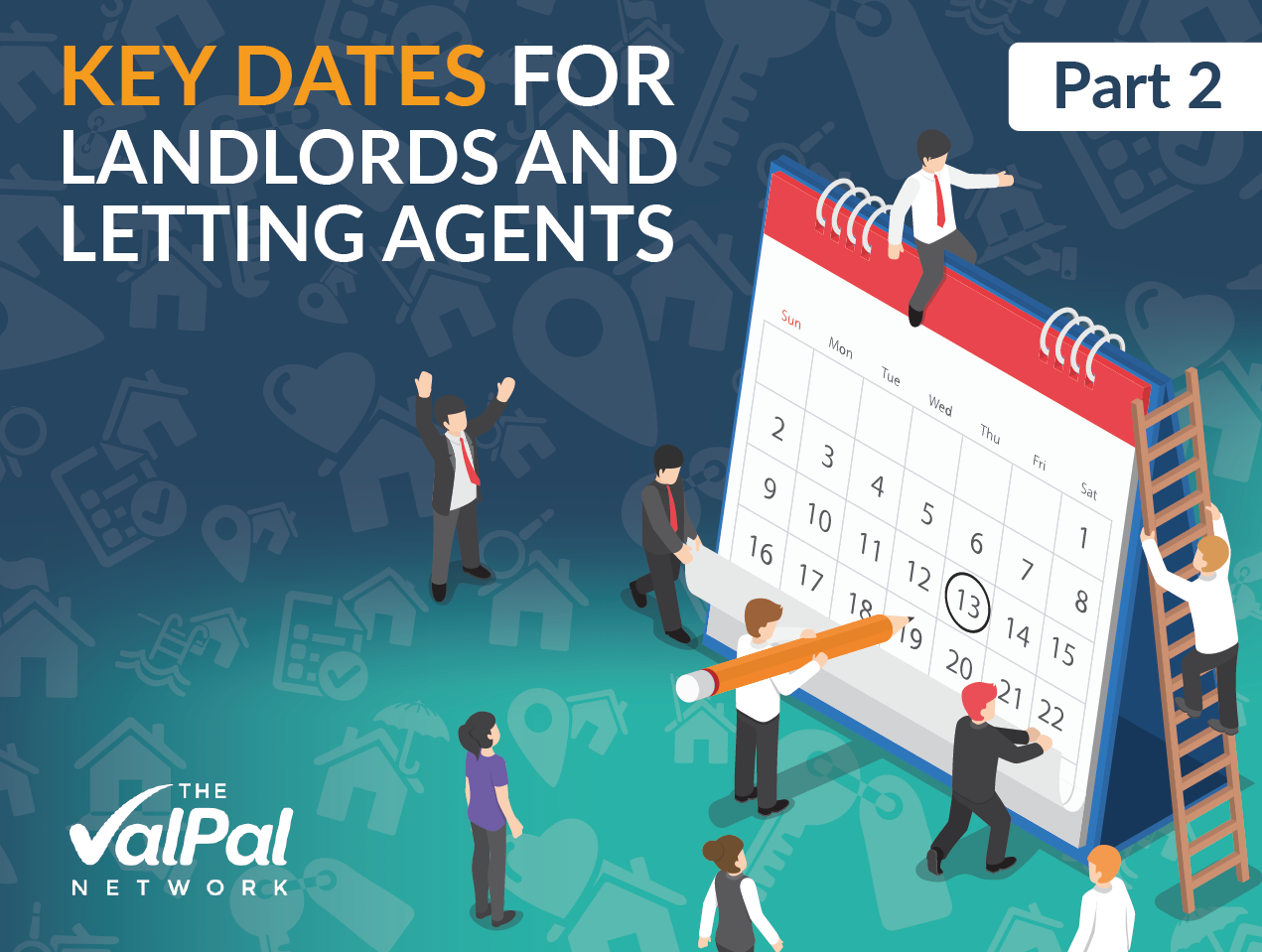Blog
All the latest from The ValPal Network

Part Two: Key dates for letting agents and landlords in 2021
With the first half of 2021 complete, it’s time to prepare for what the second half of the year has in store. What new rules, changes and updates do landlords and agents need to be aware of for the rest of the year?
Knowing what to expect next will help you make the right decisions for your agency and your clients. It will also help you adapt to upcoming changes because you will already be familiar with them.
Here at The ValPal Network, we can help you approach the remainder of the year with ease. We have created this list of important dates to get you ahead of the game.
July – stamp duty holiday threshold reduction
June 30 2021 marked the end of the first stage of the stamp duty holiday, with the nil rate threshold instead falling to £250,000 until September 30. From October 1, the nil rate will fall to the pre-Covid level of £125,000.
Rishi Sunak kickstarted the stamp duty holiday in July 2020. Since then, it has helped thousands of first-time buyers and home movers living in the UK. It has also contributed greatly to the bounce-back of the UK housing market, giving buyers a helping hand purchasing properties during such a challenging time.
Despite Covid and the challenging conditions this has presented, estate agents have successfully reacted to this surge in demand by conducting virtual and Covid-safe, in-person house viewings. This has meant buyers have still been able to move home even with the Covid-19 measures in place.
Many are eager to see the impact the end to the first stage of the holiday will have on the market. Some anticipate a decline in interest, while others expect a continued surge. For the moment, high demand is being sustained and record numbers of homes are selling above asking price, highlighting the strength of the market.
According to Rightmove, in May £250,000 and below was the average asking price for properties across Yorkshire and the Humber, North East and North West England, and Wales. This indicates £250,000 is, in fact, a common purchase price, meaning demand could continue to flourish despite the stamp duty holiday reduction.
July – Right to Rent changes
Another important change occurring on the first of July concerned the government’s controversial Right to Rent policy. Now, before letting a property to EEA, EU, or Swiss nationals, landlords must move from checking their nationality to checking the UK immigration status of all adult applicants.
Since the end of the Brexit transition period on January 1 2021, EU residents have had a six-month grace period to apply for settled status. Those who applied for this before the July 1 deadline will still be allowed to remain in their rented accommodation until their paperwork completes.
Those who have not already applied are in jeopardy of losing essential rights, such as the right to rental accommodation.
August – Right to Rent measures
As a result of the pandemic, landlords and letting agents have been able to carry out Right to Rent checks by video call and submitting scanned or photographed documents. Initially, these were temporary measures to work around Covid-19 government guidelines, but they have been extended a number of times, mostly recently until the end of August.
This could be extended further, depending on restrictions, while there have been calls from some to make checks by video calls a permanent feature for those who want it in the future, given they appeared to have worked well since the onset of the Covid crisis.
September – Stamp duty holiday and furlough set to end
September 30 2021 marks the end of the stamp duty holiday. After this date, the well-liked incentive will no longer apply to residential properties that cost over £250,000. Instead, the stamp duty threshold will return to £125,000.
After being extended innumerable times, the furlough scheme – known officially as the Coronavirus Job Retention Scheme - is due to end at the end of September 2021. Under the job retention scheme, 80% of wages, which are capped at £2,500 a month, are paid to employees unable to work as a result of Covid-19.
Millions of people working across various industries have been financially supported thanks to the scheme. Without furlough, many would have been made redundant. According to Statista around 11.5 million jobs were furloughed as of May 14 2021.
Many are apprehensive as to whether the scheme will be extended again. If restrictions are reintroduced later this year, there may be calls for the scheme to be prolonged once more.
There is a strong correlation between this financial support measure ending and the property market. The end of the scheme could leave many unemployed. Historically, increased unemployment has resulted in fallen house prices. During the 2008 financial crisis, for example, unemployment increased to 8% and house prices took a 20% dip.
There are also concerns about increased rental arrears, if tenants lose their jobs. Or landlords leaving the rental market, if they themselves become unemployed or financially compromised.
On the upside, the success of the vaccine rollout and the easing of restrictions is expected to lead to many parts of the economy reopening, which should help to protect many of the jobs that have been furloughed.
October – The ESTAS are back and the eviction process returns to normal
The ESTAS, an award ceremony that highlights excellence within the property industry, is set to take place in October. On the special day, the best agents, conveyancers, mortgage advisers and suppliers in the business are celebrated for their exceptional performance and levels of customer service.
Award shows like this are excellent because they appreciate and recognise greatness in the industry. A lot of hard work goes into the property industry, so it is great we get to come under one roof to celebrate outstanding customer service.
From October 1 2021, meanwhile, the eviction process is set to return to normal. When a Section 21 notice is issued, the notice period will return to two months.
November - The White Paper for rental reform
Though no clear date has been put forward just yet, a Rental Reform White Paper is set to come into action in autumn. Reforming the private rental sector has been one of the government’s main pledges since it came to power a few years ago, but the Covid crisis has prevented any firm action being taken so far.
We have no firm details about what the White Paper from the government will contain, but it is expected to include proposals to scrap Section 21 eviction notices and introduce lifetime deposits for tenants.
Once it has been agreed by politicians, the Renters’ Reform Bill will start its path towards legislation, expected to be late this year.
December – Stay alert
There has been no information about what the month December will have in store. As updates come through, we will update you about what to look out for.
Government restrictions, which of course stemmed from the Covid-19 pandemic, have caused changes in the property industry. The immunisation program is running smoothly, but we advise that you stay informed of any updates and possible restrictions, as these are capable of altering usual work practices.

Want to hear more?
Leave your name and contact details with us and we'll get back to you shortly!
Alternatively, you can contact us directly.
